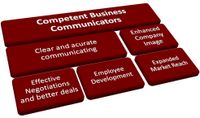AKND Training
AKND Consultants is a Business English training company with 20 years experience in transforming professionals into confident, effective communicators in the global marketplace. We on concentrate creating Competent Business Communicators.
Business Language Training Corporate Language Learning Professional Language Courses
Language Training for Executives Industry-specific Language Courses
Business Vocabulary Development Language Proficiency Assessment
Corporate Linguistic Training Language Training Solutions
Business Language Training for Negotiations Business Presentation Training
Training Topics
Business Vocabulary and Terminology Effective Business Writing
Business Grammar and Punctuation Business Idioms and Expressions
Business Presentations and Public Speaking
Telephone and Video Conferencing Skills
Business Etiquette and Cultural Awareness Business Travel English
Effective Email Communication Business Case Studies and Analysis
Competently using the English language. Covering grammar, punctuation, pronunciation, vocabulary and special phrases. A solid foundation in the language basics provides confidence in development.
Industry-specific vocabulary, common business terms, and jargon relevant to their field. This will enable them to communicate effectively with colleagues, clients, and partners.
Business Emailing Skills: Help participants enhance their written communication skills by covering topics such as email etiquette, professional writing, business letters, reports, and proposals. This will emphasize clarity, conciseness, and professionalism in their writing.
Telephone and Teleconferencing Strategy: Train participants in effective communication over the phone and in teleconferencing settings. Discuss techniques for clear articulation, active listening, and effective participation in virtual meetings.
Competent Business Communicators
Having Competent Business Communicators within an organization can provide several significant advantages.
Competent business communicators can articulate their ideas clearly and concisely.
Clear and efficient communication helps in sharing ideas, coordinating efforts, and achieving common goals more effectively.
When employees can confidently communicate with clients, partners, and stakeholders in English, it demonstrates competence and instils trust in the organization's capabilities.
Having competent English communicators empowers organizations to expand their reach and engage with a broader customer base, both domestically and globally.
Competent business English communicators can effectively present their positions, listen actively, and engage in productive negotiations, leading to better business deals and partnerships.
Encouraging and investing in English language training for employees fosters their professional development.
Training Process.
Conduct a thorough needs assessment to identify the specific communication skills required for effective Business English Communication.
Assess the participants' initial language proficiency to determine their current level and identify areas for improvement.
Based on the needs assessment, develop a well-structured curriculum that covers all the essential components.
Provide classroom instruction with skilled instructors. The instruction should be interactive, engaging, and tailored to meet the specific needs of the participants.
Focus on developing the core skills required. This includes improving speaking fluency, enhancing writing skills for business correspondence, practicing active listening, and strengthening reading comprehension.
Incorporate industry-specific content into the training program. This can involve case studies, simulations, and real-world business scenarios to help participants apply their language skills in practical situations.
Provide regular feedback and assessment to participants on their progress. This can include individual and group evaluations, oral presentations, written assignments, and mock business situations.
The training process will be dynamic and adaptable based on the specific needs and goals of the participants.
Training Topics
Competently using the English language. Covering grammar, punctuation, pronunciation, vocabulary and special phrases. A solid foundation in the language basics provides confidence in development.
Industry-specific vocabulary, common business terms, and jargon relevant to their field. This will enable them to communicate effectively with colleagues, clients, and partners.
Business Emailing Skills: Help participants enhance their written communication skills by covering topics such as email etiquette, professional writing, business letters, reports, and proposals. This will emphasize clarity, conciseness, and professionalism in their writing.
Telephone and Teleconferencing Strategy: Train participants in effective communication over the phone and in teleconferencing settings. Discuss techniques for clear articulation, active listening, and effective participation in virtual meetings.


